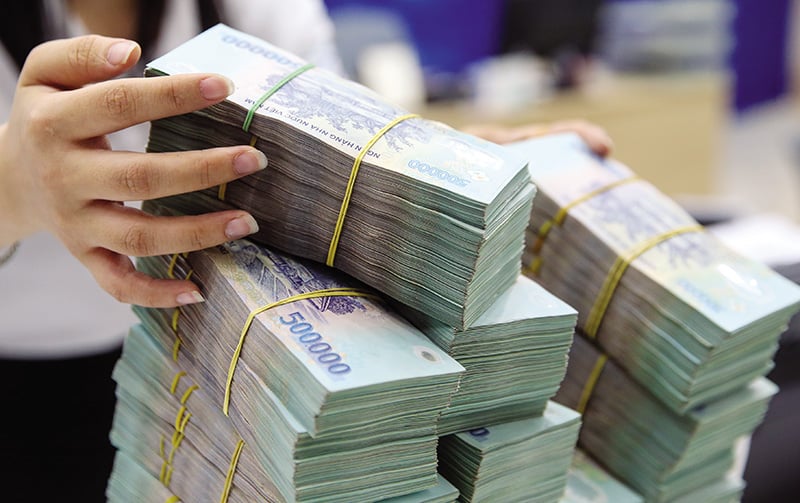 |
| Commercial banks will strictly control large real estate loans. Photo : Duc Thanh |
Real estate credit increased sharply
According to the State Bank of Vietnam, by the end of August 2025, total credit in the entire system increased by more than 11%. Meanwhile, according to Dau Tu Newspaper, credit for home purchase and home repair by individuals grew slowly, while real estate business credit alone increased by nearly 30%, or about 3 times the credit growth rate of the entire system.
Working with the State Bank of Vietnam last week, Deputy Prime Minister Ho Duc Phoc requested credit to be directed to priority areas, while tightly controlling the cash flow of commercial banks, especially real estate loans which account for a high proportion.
Looking at the capital structure, it can be seen that most real estate enterprises still depend mainly on bank credit. High real estate prices, signs of market recovery and the State Bank loosening credit room have made banks lend heavily to investors.
Meanwhile, other medium- and long-term capital mobilization channels have not yet recovered clearly. From the beginning of the year to the end of August 2025, real estate enterprises issued about 61,000 billion VND in bonds, accounting for 17% of the total bond issuance. However, this figure is not enough to offset the amount of bonds maturing since the beginning of the year.
“Corporate bonds, which were expected to be the most important capital mobilization channel for real estate, have so far recovered slowly, while maturity pressure is at a record level. The bright spot is that the most difficult period has passed (the peak maturity falls in August 2025). If the market continues to recover, businesses will avoid the risk of mass bankruptcy. However, in the coming time, businesses need to diversify capital sources, avoid spreading investments, and control overdue debts. In particular, banks need to regulate capital flows into healthier and more sustainable segments,” Dr. Can Van Luc, member of the Prime Minister's Policy Advisory Council, recommended.
According to experts, over the past year, the real estate market has shown signs of recovery, with many segments experiencing strong price increases, but liquidity remains very weak. The main reason is that capital flows are skewed towards supply, concentrated in high-end projects. The irrationality of segments has caused demand for loans to buy real homes to increase slowly. High housing prices exceed affordability, even though home loan interest rates are at a reasonable level, making real buyers still hesitant.
“Real estate prices are still high, but brokers are complaining about sluggish sales. Except for the mid-range segment worth several billion VND that is still selling, most products are difficult to sell, and market liquidity is extremely weak,” said Mr. Phan Dung Khanh, Director of Investment Consulting, Maybank Investment Bank.
Speculative real estate faces difficulties
Mr. Khanh said that the new move of the Government shows that in the coming time, capital flow into speculative real estate, buying and selling will be tightened. At the same time, many bills are being studied and amended in the direction of limiting speculation, directing the market to develop sustainably, serving economic growth.
Regarding the view that the real estate market shows signs of a bubble, when housing prices are pushed too high, Mr. Nguyen Quang Huy, CEO of the Faculty of Finance and Banking (Nguyen Trai University) said that the sharp increase in prices is mainly due to the imbalance in the supply-demand structure, not entirely due to speculation.
“Slow project legality has led to a shortage of supply, while the demand for housing, industrial parks and logistics infrastructure is huge. High housing prices are the result of supply bottlenecks, not necessarily a speculative bubble,” Mr. Huy analyzed.
According to Dr. Can Van Luc's calculations, the price of an apartment in Vietnam is currently equivalent to nearly 26 years of average family income, while the world average is only about 15 years. People's income not keeping up with the rate of real estate price increase is a difficult problem and reducing housing prices is an extremely big challenge.
Experts warn that although home loan interest rates are currently low, helping the market maintain purchasing power, if interest rates rise again, many borrowers will lose their ability to balance their finances, leading to market instability. In fact, primary real estate is still for sale, but secondary real estate (buy and sell) is illiquid, posing great risks to those holding high-priced products.
“To achieve double-digit economic growth, both the financial and real estate markets must be stable. If one of the two has problems, the risk of a crisis like China, which struggled for four years because of real estate, is very clear,” Dr. Can Van Luc warned.
Regarding the state management agency, Mr. Vuong Duy Dung, Deputy Director of the Department of Housing and Real Estate Market Management (Ministry of Construction) said that the real estate supply is still limited, much lower than the demand. The government is focusing on removing obstacles, especially in investment, construction and planning procedures. When procedural costs and compliance costs decrease, the supply will increase.
“Regarding housing prices, although the market structure has been adjusted, the low-cost segment and housing for low-income people is still seriously lacking. In the coming time, the Government will issue more solutions to encourage the development of these segments, and at the same time have policies to reduce input costs for businesses, especially land use fees,” said Mr. Dung.
The third Vietnam Financial Advisors Summit 2025 (VWAS 2025), organized by the Finance - Investment Newspaper on Thursday, September 25, 2025 at Pullman Hotel (Hanoi), will gather leading domestic and international experts, focusing on in-depth discussions on the impact of new institutions and new dynamics on the economy and financial markets. The forum will also analyze in detail the breakthrough growth points of traditional investment asset classes as well as opportunities with crypto assets.
The forum includes activities:
The main workshop with 2 sessions presenting and discussing the topics "Support for market resilience"; "Finding breakthroughs for asset classes".
Honoring typical financial products/services in 2025 in the fields of banking, insurance, real estate, fund management, securities and financial technology.
Details: wwa.vir.com.vn
Source: https://baodautu.vn/ham-phanh-dong-von-dau-co-vao-bat-dong-san-d389785.html






![[Photo] Prime Minister Pham Minh Chinh meets with representatives of outstanding teachers](https://vphoto.vietnam.vn/thumb/1200x675/vietnam/resource/IMAGE/2025/11/15/1763215934276_dsc-0578-jpg.webp)
![[Photo] General Secretary To Lam receives Vice President of Luxshare-ICT Group (China)](https://vphoto.vietnam.vn/thumb/1200x675/vietnam/resource/IMAGE/2025/11/15/1763211137119_a1-bnd-7809-8939-jpg.webp)


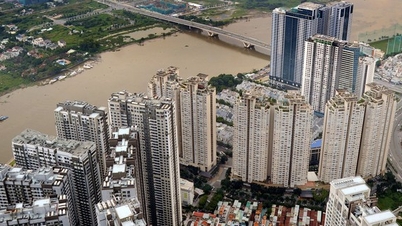


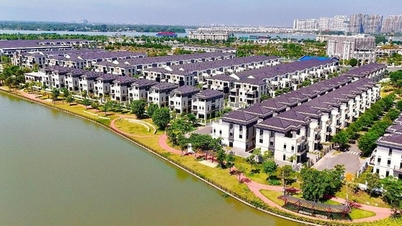

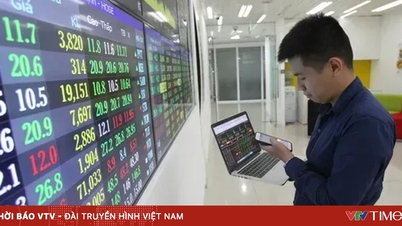




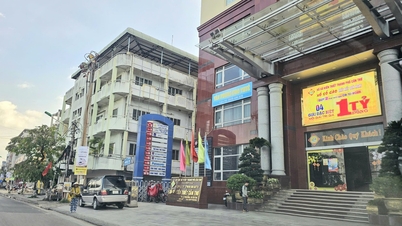




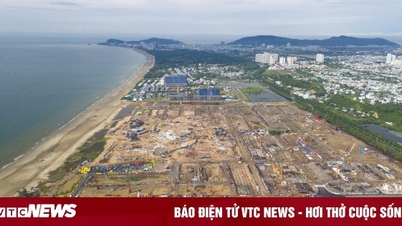
















































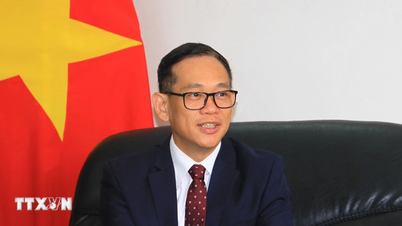







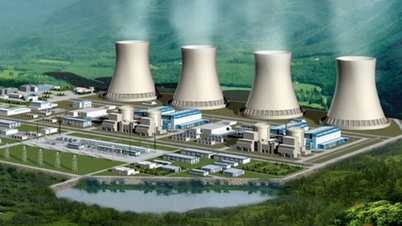



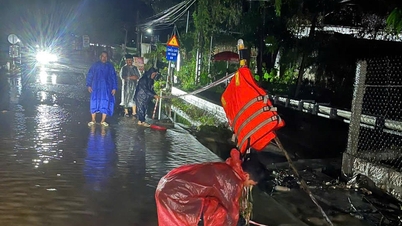

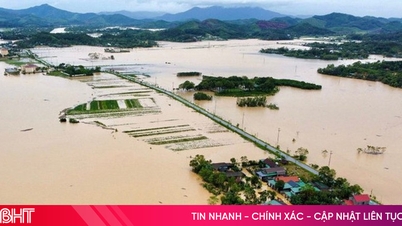



















Comment (0)